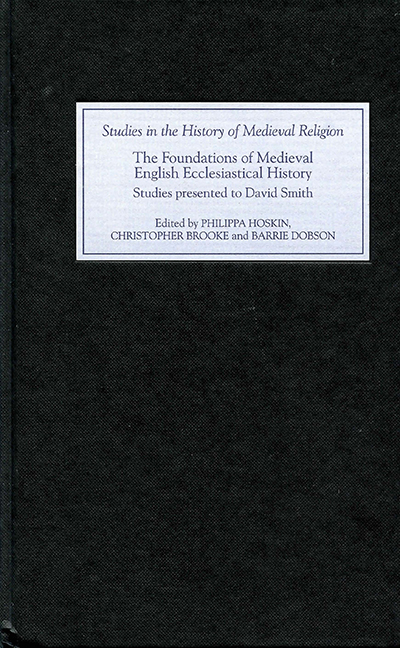Book contents
- Frontmatter
- Contents
- List of Contributors
- Acknowledgements
- Abbreviations
- Miscellaneous Frontmatter
- David Smith: the Scholar
- ‘The archivist is not and ought not to be a historian.’ David Smith and the Borthwick Institute
- Why Forge Episcopal Acta? Preliminary Observations on the Forged Charters in the English Episcopal Acta Series
- Pastors and Masters: the Beneficed Clergy of North-East Lincolnshire, 1290–1340
- The Convent and the Community: Cause Papers as a Source for Monastic History
- Patriarchy and Patrimony: Investing in the Medieval College
- ‘Above all these Charity’: the Career of Walter Suffield, Bishop of Norwich, 1244–57
- The Law of Charity and the English Ecclesiastical Courts
- Continuing Service: the Episcopal Households of Thirteenth-Century Durham
- The Acta of English Rural Deans in the later Twelfth and early Thirteenth Centuries
- The Court of Arches and the Bishop of Salisbury
- Bishops’ Registers and Political History: a Neglected Resource
- The Vatican Archives, the Papal Registers and Great Britain and Ireland: the Foundations of Historical Research
- Bibliography of the Writings of David Smith
- Index
- Tabula Gratulatoria
Bishops’ Registers and Political History: a Neglected Resource
Published online by Cambridge University Press: 24 October 2017
- Frontmatter
- Contents
- List of Contributors
- Acknowledgements
- Abbreviations
- Miscellaneous Frontmatter
- David Smith: the Scholar
- ‘The archivist is not and ought not to be a historian.’ David Smith and the Borthwick Institute
- Why Forge Episcopal Acta? Preliminary Observations on the Forged Charters in the English Episcopal Acta Series
- Pastors and Masters: the Beneficed Clergy of North-East Lincolnshire, 1290–1340
- The Convent and the Community: Cause Papers as a Source for Monastic History
- Patriarchy and Patrimony: Investing in the Medieval College
- ‘Above all these Charity’: the Career of Walter Suffield, Bishop of Norwich, 1244–57
- The Law of Charity and the English Ecclesiastical Courts
- Continuing Service: the Episcopal Households of Thirteenth-Century Durham
- The Acta of English Rural Deans in the later Twelfth and early Thirteenth Centuries
- The Court of Arches and the Bishop of Salisbury
- Bishops’ Registers and Political History: a Neglected Resource
- The Vatican Archives, the Papal Registers and Great Britain and Ireland: the Foundations of Historical Research
- Bibliography of the Writings of David Smith
- Index
- Tabula Gratulatoria
Summary
It is a truth insufficiently acknowledged that the registers of medieval English bishops are a rich quarry for the political historian. Historians of secular events overlook this material because they do not imagine that church records will contain anything useful for their enquiries, and it is the purpose of this essay to urge them to look more carefully at bishops’ registers, for in this class of record will be found rich and unexpected rewards, the ‘Uncovenanted Blessings of Ecclesiastical Records’, of which the late Professor Rosalind Hill (a warm admirer of David Smith) so eloquently spoke.1 In this article I will not attempt to give a complete catalogue of such material, but rather, by drawing examples from a number of different dioceses, hope to encourage students of English political history in the later middle ages to investigate this class of record for themselves. It will be immediately obvious that any such collection of examples will owe much to the editors of bishops’ registers, those unsung heroes and heroines whose work is published by such learned societies as the Canterbury and York Society and the Lincoln Record Society, to both of which David Smith has given, and continues to give, such distinguished service.
Medieval bishops were, in every sense, public figures and public servants, and many had previous or concurrent experience in secular administration. Helping to administer the realm and putting into execution crown policy was part of their job, and there is no evidence that they resented this or regarded their secular administrative duties as an imposition; nor is this surprising, for good order and respect for authority were the goals of both crown and church governments. The bulk of this secular work, as recorded in their registers, was of a local nature. Yet what would seem to be purely local matters could sometimes have wider implications. For example, John le Breton, bishop of Hereford, was also sheriff of Hereford, and a servant of the Lord Edward; he was bailiff at Abergavenny and keeper of Montgomery castle in 1257, but by 1261 had become keeper of the prince's wardrobe. He died in 1275 and over the next two years his executors filed a series of accounts which were copied into the register of his successor.
- Type
- Chapter
- Information
- The Foundations of Medieval English Ecclesiastical HistoryStudies Presented to David Smith, pp. 173 - 193Publisher: Boydell & BrewerPrint publication year: 2005

